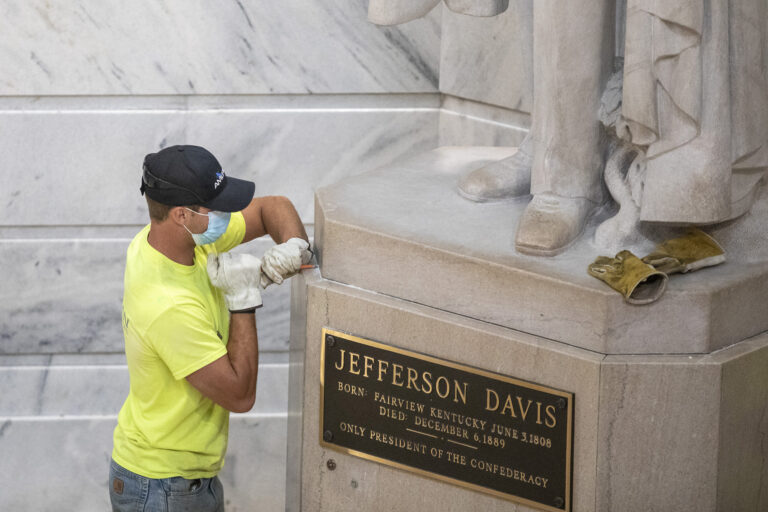A new bill proposed by the Kentucky House State Government Committee would give the General Assembly the final say over what can be permanently displayed in the Capitol rotunda.
Dedicated in 1910, the Kentucky Capitol holds the House and Senate chambers, as well as the Supreme Court room for the state judicial branch.
Almost four years after a Confederate statue was removed from the rotunda, House Bill 513, sponsored by Representative David Hale (R-Wellington), gives the General Assembly approval power over the “installation or removal of statues, monuments, or objects of art on permanent display in the rotunda of the New State Capitol.”
The bill includes a process for the Historic Properties Advisory Commission to seek the legislature’s approval and holds commission members financially responsible for the costs of any removal or installations that violate the bill’s provisions.
The statue of Jefferson Davis, the Kentucky-born president of the Confederate States of America, was removed in 2020 after a vote of the Historic Properties Advisory Commission.
Hale, the chairman of the House committee, has repeatedly told members that the removal of the Davis statue has no relation to his bill.
“The bill today is not pertaining to anything that was done in the past as far as a removal of a specific statue. This has nothing to do with that. That’s happened and that’s far behind us,” Hale said.
Democrats on the committee however, believe that there is a connection between Hale’s bill and the Confederate statue. Representative Derrick Graham (D-Frankfort), said the Davis statue was “taken out for a reason.” The reason being, according to Graham, that Davis led the Confederacy and the “insurrection taking place when the Civil War started.”
“We can’t erase history, but what we can do is make sure that those who have been loyal to the United States of America that we honor them, and those who have not been particularly supportive of our country at the entire time that they lived, those individuals should not be honored,” Graham said.
While he was born in Kentucky, Davis grew up in Mississippi. As a slaveholder, he used his position in the Senate to argue in favor of slavery. In Feb. 1850, he delivered a two day speech in Congress “on the subject of slavery in the territories.”
Against the backdrop of the Compromise of 1850, Davis claimed that all new territories added to the Union should be open to slavery and furthermore, that the Constitution supports it.
“Slavery existed before the formation of this Union. It derived from the Constitution that recognition which it would not have enjoyed without the confederation,” said Davis. “If the States had not united together, there would have been no obligation on adjoining States to regard any species of property unknown to themselves. But it was one of the compromises of the Constitution that the slave property in the Southern States should be recognized as property throughout the United States.”
Davis was elected president of the Provisional Government of the Confederacy on Feb. 9, 1861 but was charged with treason against the United States in 1869. Instead of the trial proceeding however, federal prosecutors entered a “nolle prosequi,” or statement of decision not to prosecute.
In 2020, Governor Andy Beshear called for the removal of the statue of Davis. On the day it was taken down, Beshear called it “a step forward for the betterment of every single Kentuckian.”
Critics worry the bill will undermine the authority of the governor’s appointed Historic Properties Advisory Commission. However, according to the bill, they will still oversee historic properties such as the Executive Mansion, the Vest Lindsey House and other displays in the Capitol. They would be required however, to submit proposals for permanent displays to the Legislative Research Commission.
Representative Savannah Maddox (R-Dry Ridge) supports the bill as it helps bring Kentuckians into the process.
“If anything, I think that bringing the people’s branch of government into having input in this decision-making process, to provide that approval, is a good thing because we want this particular space to reflect our heritage here in the commonwealth,” Maddox said. “We want it to reflect our history, and we want the people’s branch of government to have input in that.”




